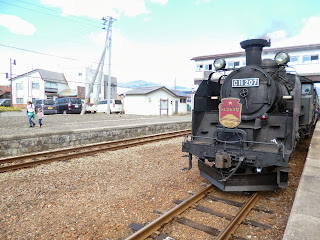 |
| The SL arrives. Two Minutes Late. |
My homestay mother takes me on the steam train. As the only foreigner, our fellow travellers' attention seems to be split between eagerly awaiting the arrival of the Steam Locomotive ('SL' in Japanese if you please) and myself. The platform warden stands next to me and stares. Now and again he motions for me to step back.
"Train's coming," he explains.
It comes in a cloud of smoke, juttering and chugging its way down the line. The children wave energetically.
"No electricity," my homestay mother explains. "So slow. So dangerous!" I try and tell her that in Wales all the trains run on diesel, but I can tell she doesn't believe me.
 |
| Smoke billows from the engine |
We wind our way through the Hokkaidan countryside, brushing past forests and glades, glimpsing Youtei-san from his many angles. Photographers hide in the bushes, balance on ladders, perch next to the tracks on little stools - so that they can get a good shot of the Steam Locomotive. I laugh. My homestay mother rolls her eyes - "so serious!" she complains.
***
She takes me to the local library where we meet her old friend Yama-San and the librarians (all women - they're such close friends, she says). We spend a long time peering at the YA books and the cooking magazines. Then she takes me to ski resort after ski resort. One more famous than the next, but all of them empty. Ghost towns in the non-season. Huge, ugly apartment buildings jut out of the ground. Hotels as big as Tokyo offices. Vast restaurant and souvenir complexes. All, all, empty. The roads are being dug up and broadened, ready for the winter season.
"Usually there are many Australian tourists. They come here and eat a lot, drink a lot, stay for week after week, having a great time. Great memories."
"But now..."I say, a little sadly.
"Sometimes," she says, encouragingly, "people come to see the view. Sometimes."
***
"The on-demand bus arrives at half five! So prepare yourself!"
My homestay father waits downstairs. He asks me if I cried when I phoned my mum and dad and I tell him I don't. "But you're an only child aren't you?" he says, perplexed.
I get into the mini-bus. Just me and my homestay parents, all sitting separately. We're joined by Yama-San and his wife, who both used to teach in High Schools in Tokyo. I don't know where we're going, what we're doing. Happily, it turns out we are going to the Sushi-Ya in Niseko.
They spend a good long time explaining to me all the different types of fish which decorate the central plate. How to hold chopsticks; drink miso soup; how to mix ginger and wasabi with the soy-sauce. How to drink sake overflowing from the cup as if you're kissing a woman - no, better than kissing, more intimate, Yama-San explains.
 |
| Thy cup overfloweth |
The wives talk about a local author who has written an erotic novel based on a Love Motel.
"Will you read it?"
"No. Absolutely not. I can't. Will you?"
"I don't know. No. Maybe. Will you?"
"Out of the question. You?"
"Me too. But still. Isn't it interesting?"
The last platter of sushi is a positive battle. "Eat it!" "No, no, you, please..." "No, I insist, I can't possible..."Dances of politeness and embarrassment are few, however, compared to the merry, luxurious mood in which the evening passes. An evening laced with sake, laced with good company, anecdotes and travel stories. I'm laughing all the time. And sometimes I think I even understand the joke. As when the waiter brings us a plate of seafood and my homestay father puns,
"Ikaga desu ka?" (Is this alright with you?) "Ika ga desu ka?" (Is this squid?)
My homestay mother groans. "Bad joke," she complains, shaking her head. "Low level."
 |
| Only the beginning |
We arrive home. Outside the house I stop and look up at the sky and, for the first time in a year, it seems, I see the full canopy of stars. The moon bright and un-touched, like a newly-minted coin. And before me the rigid form if Youtei-san - that almost-Fuji of Hokkaido - more beautiful, perhaps, than the holy mountain - rising up in the night-time sky.
















































